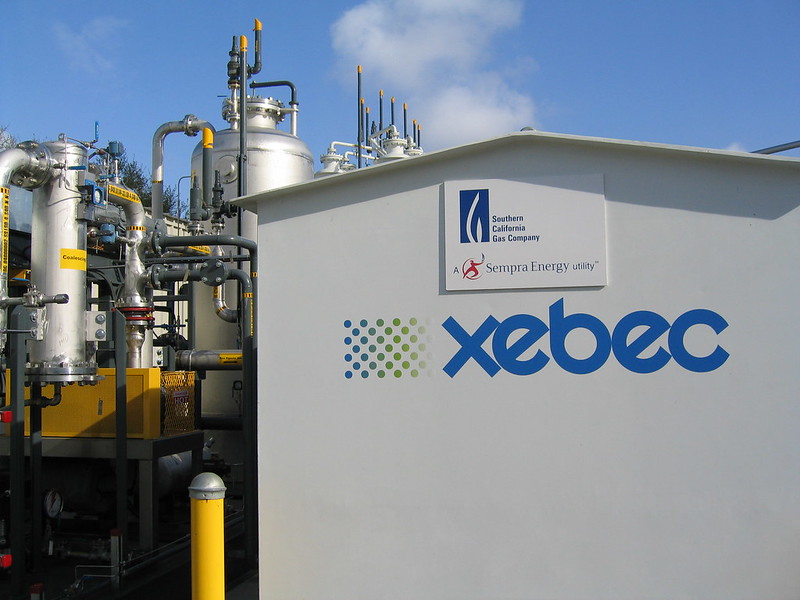As California works to shift away from fossil fuels to meet its climate goals, one of the state’s largest suppliers of fossil energy is fighting tooth-and-nail against this energy transition, even to the point of taking California to court over its energy policy.
Southern California Gas Company (SoCalGas) recently filed a lawsuit against the California Energy Commission, a state energy policy and planning agency, for allegedly aiming to “substantially eliminate” gas use in the state and violating a California natural gas law.
SoCalGas claims that a planning document — called an Integrated Energy Policy Report (IEPR) — that the commission adopted earlier this year minimizes the role of gas in the state and is unlawful under the state’s 2013 Natural Gas Act, which requires the commission to outline how to “maximize the benefits” of gas as an energy source. The California Energy Commission addressed gas benefits in an appendix to the IEPR, but SoCalGas argues that a separate report is required to comply with the statute.
California has been sued over climate change policy — by the nation’s biggest gas utility.@Sammy_Roth reports: https://t.co/Sob7iulhZE
— Los Angeles Times (@latimes) August 5, 2020
SoCalGas filed the lawsuit last week in California Superior Court. Union groups representing the gas company’s employees as well as a company called Clean Energy Fuels, which owns natural gas vehicle fueling stations, have joined in suing the state. Together these gas interests seek a court order to overturn what they describe as the California Energy Commission’s “Anti-Natural Gas Policy.”
Gas Company Undermining California Climate Policy
The lawsuit comes as SoCalGas faces an ongoing investigation by a state consumer watchdog office into the company’s use of ratepayer money for natural gas advocacy, which the investigators say undermines the state’s climate policies.
NEW: Southern California Gas has been using ratepayer money to fund pro-natural gas advocacy groups, according to documents shared with me by the Public Utilities Commission’s independent consumer watchdog.
Why does this matter? A quick thread… https://t.co/lGy92yf8A6 (1/n)
— Sammy Roth (@Sammy_Roth) November 22, 2019
The California Public Utilities Commission’s Public Advocates Office, the watchdog office investigating SoCalGas, has found the company used customer money to fight an efficiency standard for gas furnaces and to set up a gas advocacy group called Californians for Balanced Energy Solutions. The head of that group wrote to city officials in San Luis Obispo this past spring, threatening to bus in hundreds of protesters in defiance of social distancing recommendations during the pandemic in an attempt to block the city from passing an ordinance encouraging the transition to all-electric buildings. San Luis Obispo passed its Clean Energy Choice ordinance in June, joining over 50 California communities that have passed or are considering policies aimed at curbing direct gas use as a pathway to decarbonizing the building sector.
These local initiatives, and the state’s overall goals of reducing fossil fuels to meet its climate targets, pose an existential threat to SoCalGas. The multi-billion-dollar company is the nation’s largest gas utility and serves nearly 22 million customers in central and southern California. Unlike utilities that service both gas and electricity, gas-only utilities like SoCalGas face a uniquely uncertain future as cities and states look to phase out gas in favor of all-electric buildings, which are not tied to a single polluting energy source and can tap carbon-free sources like solar and hydropower. California, New York, and Massachusetts are all beginning to consider how to manage a transition away from natural gas power.
Besides allegedly abusing ratepayer funds and spearheading a front group that used a public health threat in an attempt to thwart a vote on a community’s building electrification policy, SoCalGas is reportedly refusing to comply with a subpoena from the watchdog office investigating it. According to the Los Angeles Times, SoCalGas says its “constitutional rights are being trampled” and the company is “refusing to give regulators full access to its financial records.”
Climate reporter Emily Atkin, publisher of the HEATED newsletter, recently summed up the gas utility’s “shady behavior,” writing that SoCalGas “is trying to prevent regulators from learning more about its tactics to prevent meaningful climate policy across California.”
The nation’s largest gas utility is trying to prevent regulators from learning more about its anti-climate political tactics.
This is typical behavior for private electric utilities, which have been “central to the climate change countermovement”https://t.co/BaWPMHGMmt
— Emily Atkin (@emorwee) July 27, 2020
Now SoCalGas is taking California’s energy commission to court. From the gas utility’s perspective, both fossil gas and what the gas industry calls “renewable natural gas” (methane derived from landfills and agricultural waste) are key to reducing greenhouse gas emissions and should not be eliminated from the energy system.
“Natural gas has played a significant role in reducing greenhouse gas emissions and improving air quality, and natural gas and renewable gas remain critical to meeting California’s energy goals,” the lawsuit states.
.@socalgas sues @CalEnergy for not saying enough nice things about gas. A flailing and petulant move by gas industry willing to try anything to prevent California from moving past fossil fuels. https://t.co/01sFjdLwBb
— Matt Vespa (@missionvespa) August 4, 2020
But environmental and clean energy advocates argue that natural gas, which is still a fossil fuel, must be phased out in order to meet climate targets and that renewable gas is not a viable alternative to electrifying buildings. Matt Vespa, a San Francisco-based clean energy attorney for Earthjustice working on decarbonizing California, said via Twitter that the SoCalGas lawsuit “is a flailing and petulant move by [the] gas industry willing to try anything to prevent California from moving past fossil fuels.”
Main image: February 8, 2011, Southern California Gas Co. (SoCalGas) and the city of Escondido announced a project to purify wastewater biogas to meet natural gas standards. Credit: Genevieve Prentice, CC BY–SA 2.0
Subscribe to our newsletter
Stay up to date with DeSmog news and alerts







